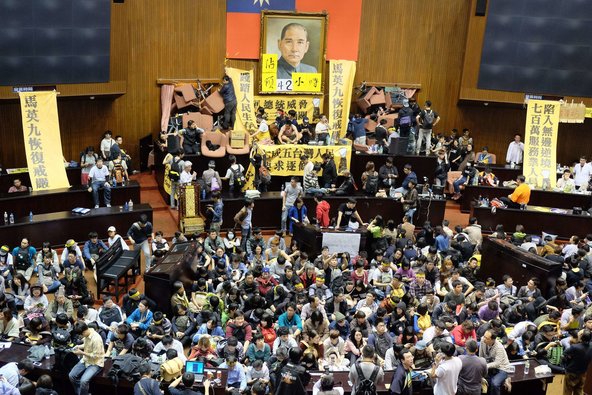As students and activists begin their third day occupying Taiwan’s Legislative Yuan in protest of the ruling Kuomintang party’s decision to pass a controversial China trade pact without the agreed-upon review, a report from the Economist summarizes protestors’ demands and characterizes the ongoing occupation as peaceful:
Outside, a crowd of several hundred ignores the drizzle to listen to speeches and songs, wave artificial sunflowers, and shout denunciations of the government and of Taiwan’s president, Ma Ying-jeou.
The occupation was billed as lasting 120 hours, to block a plenary parliamentary session on Friday 21st March, and to provide a deadline for the government to meet the protesters’ demands. These are three-fold: they want Mr Ma to come to the chamber himself to apologise for the way in which his party pushed an agreement on opening up services trade with China through parliament on Monday (available here, in Chinese); they also want the parliamentary speaker, Wang Jin-pyng (who happens to be a rival to Mr Ma in the ruling party, the Kuomintang, or KMT ) to come to pay his respects; and they want legislation passed to institutionalise parliament’s right to scrutinise such agreements item by item.
It is already highly unusual for a government to have tolerated the seizure of parliament by protesters for so long. But, fearful of the ugly headlines using force against peaceful students would attract, it does not have many easy options. […] [Source]
For a detailed and succinct explanation of the legislative politics and public discontent that led up to the occupation, see J. Michael Cole’s write-up at The Diplomat.
While the Economist portrays the occupying activists as peaceful and orderly, an English-language report from Xinhua focuses on physical skirmishes and public calls for restraint:
Physical disputes had broken out between police and students, who gathered at the legislative building in Taipei accusing the Kuomintang of cutting short the review of the cross-Strait service trade agreement.
[…M]embers of the public called for restraint.
A middle-aged man urged a group of students outside the building to be rational and not disrupt legislative proceedings.
Wang Jin-pyng, head of the legislative body, called for calmness, so the legislative body could resume its work on the agreement.
The Kuomintang central committee issued a statement calling for the rational expression of opinions, while accusing the opposition Democratic Progressive Party of inciting the public. [Source]
The occupation has been continuously live-streamed since its beginning, and a few unflattering frames harvested from the hours of footage have begun circulating Sina Weibo. These images have stoked a Mainland conversation in which some are questioning Taiwan’s model of democratization. From the South China Morning Post:
Taiwan has long been seen as a successful democracy that many of China’s liberals believe the mainland should emulate. Many especially believed its relatively peaceful transition from an autocracy to a democratic system served as a perfect example for the mainland’s future political reform.
Yet pictures of the student protesters vandalising facilities in the legislature seemed to have shattered the belief previously held by many mainlanders.
“This is not the democracy we want for China,” many wrote on Weibo.
“Are we sure the Cultural Revolution is over? Watch those Taiwanese ‘Red Guards’,” microbloggers commented on pictures which showed students tearing down and vandalising the plaque of the Taiwanese legislature.
[…] “We can’t blame either side alone for the problem, ” Tong Zongjin, an associate professor at China University of Political Science and Law, said. “But political problems should best be resolved through legal channels instead of resorting to an occupation of this kind.”
Tong said the occupation of the Taiwanese legislature and vandalism were “absolutely illegal.” [Source]
Some Taiwanese media voices have likewise focused on the illegality of the occupation, portraying it as a “shame to democracy.” In a post for the University of Nottingham’s China Policy Blog, J. Michael Cole contrasts Taiwanese media portrayals of activists as unruly and violent with his own observations, and notes that the protestors themselves are demonstrating against the KMT’s disregard for democratic rules:
After repeated failed attempts by police to dislodge the protesters and as the number of people outside the legislature swelled to several thousands, figures of authority began portraying the occupation as “undemocratic.” Again, several journalists, who have had it drilled into them that their duty is to serve power rather than speak truth to it (echoes of an authoritarian era), were all too willing to oblige. […]
[…] What none of the critics ever mentioned was the fact that the entire process behind the Cross-Strait Services Trade Agreement (CSSTA) was severely flawed from the beginning and that the Cabinet, with the help of accomplices among KMT legislators, was breaking democratic rules — at a minimum, expectations — by skipping the agreed-upon line-by-line review. With more than 70 per cent of the public saying they want a close legislative review of a pact that is widely regarded as potentially harmful to several sectors of the island’s economy and to its democracy, the executive nevertheless went in the opposite direction and has added that the agreement cannot be amended and must be passed “as is.”
Despite all this, authority figures and the media maintained that activists had no right to use “undemocratic” means to counter government policy that itself refused to abide by democratic rules. The critics conveniently made no mention of the context in which the occupation occurred: the skewed public hearings and the unwillingness of the government to take public apprehensions seriously. […] [Source]
Meanwhile in Wukan, where faith in a limited democratic experiment continues to wear thin, a second elected leader has been detained for bribery. Local elections were initiated in the small Guangdong village after extended protests against official corruption attracted international attention in 2011.








